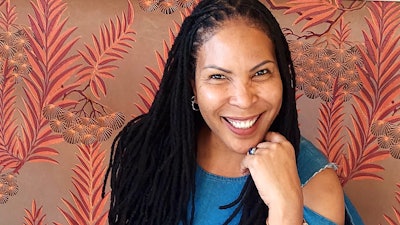As my high school basketball coaches taught me, it is not the defense that stops you; it is failing to see the opportunities. There is always somewhere to pass, dribble or score.
Now that I am an Afrocentric academic and publisher, I don’t want to miss any opportunities to liberate, elevate, and expand Black voices.
I have grown my company, Universal Write Press, from a school-based concern that worked with superintendents to help young children create and publish their own books into a publisher of Black scholars fully parallel to university presses. At the height of the Black Lives Matter movement, we entered a partnership with SAGE Publishing to gain greater marketing and distribution, and they remain a critical co-conspirator. Dr. Ayo Sekai
Dr. Ayo Sekai
But as we all join together to fight censorship this month during Banned Books Week, we have to reckon with the fact that for Black authors struggling for equality and social justice, Banned Books Week can feel like a 52-week affair. Throughout history, many books written by Black authors or addressing issues related to the Black community have been banned or censored. This suppression often stems from racist ideologies and a desire to maintain the status quo of oppression. Banning these books is a way of silencing Black voices and perspectives.
In the “publish or perish” profession, Black academics, in particular, exist at the margins of the publishing world, with unsteady access to the lifeblood of their careers. Black faculty are often overloaded with teaching work and special projects that limit their time for research. When they do have research written up and ready to submit to journals, nonwhite academics are less likely to be journal editors, they wait longer for acceptance of their submissions, and their published work gets cited less. Among the people who comprise the publishing industry, 76% are white versus just 5% Black.
Minority publishers like mine face obstacles too, unable to access the same credit from vendors, distributors and cost-effective business management that major publishers enjoy.
We want to enable our community to tell our own stories through Black academic excellence. As UWP and others, free from marginalization and censorship, bring authentic representation to Black and Brown voices, we can own our narratives and reclaim our agency. Our authors are held to the same levels of rigor which includes peer review, authentic research, and methodologies that are demanded from academic institutions, but they are free from linguicide and the political pressure that other publication teams may bring to bear. The result, I hope, will be an honest dialogue about Black representation and contributions, not just in the academy, but to the past, present and future history of our collectively lived experience.
Contrary to the prevailing, Eurocentric view, Black history does not begin with slavery. The Black experience is not simply an admirable struggle to overcome enslavement and bondage. That narrative is not correct, and it’s also perniciously oppressive.
African-centered thinkers absorb knowledge differently. They learn an appreciation of ancient civilizations that advanced astronomy, medicine, language and building methods long before the first enslaved peoples were brought to the New World. And as we flourished then, we work hard now to help more Black scholars triumph today.
To succeed, we can’t miss an opportunity. Major publishers must recognize that their successful effort to hire a more diverse workforce has not addressed the marginalization of minority publishers, or served the industry as a whole. Why should a large publishing house be a one-size-fits-all solution for every book? Authors and ideas benefit when there is a broad market for their services, including niche publishers. Anything less will just perpetuate the exclusion and lack of diversity of industry voices. So while the publishing industry is diverse, minority-owned publishers remain suppressed as they are forced to operate on the periphery of academe.
Just as I learned as captain of my high school basketball team and then as a university athlete, a missed shot can lead to a winning basket; there is a solution for every problem. We can diminish dangerous narratives that distort historical truths for young people in certain states and impoverish human development and knowledge. It all starts with representation and having a vision. Being seen.
Ayo Sekai, Ph.D., is the founder and CEO of Universal Write Press, an academic press that represents the voices of the African Diaspora with an emphasis on African and Black-centered scholarship. She is working on a memoir, “Pieces of Me.”
![Ayo Sekai1[407085]](https://img.diverseeducation.com/files/base/diverse/all/image/2023/10/AyoSekai1_407085_.651e06b004174.png?auto=format%2Ccompress&crop=faces&fit=crop&h=48&q=70&rect=0%2C28%2C1483%2C834&w=48)


















